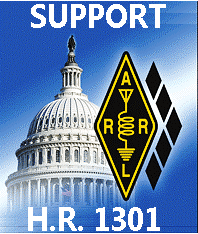 ARRL President Kay Craigie, N3KN, has told Section Mangers that, while promotion and positive publicity about the Amateur Radio Parity Act (H.R. 1301) are always helpful, the most useful action radio amateurs can take is to contact their members of Congress, urging them to sign on as cosponsors. As of June 9, 72 members of the US House in both parties were listed as cosponsors of the proposed legislation, which would direct the FCC to extend its rules relating to reasonable accommodation of Amateur Service communications to private land-use restrictions. Craigie told the SMs that the grassroots campaign supporting H.R. 1301 needs more letters.
ARRL President Kay Craigie, N3KN, has told Section Mangers that, while promotion and positive publicity about the Amateur Radio Parity Act (H.R. 1301) are always helpful, the most useful action radio amateurs can take is to contact their members of Congress, urging them to sign on as cosponsors. As of June 9, 72 members of the US House in both parties were listed as cosponsors of the proposed legislation, which would direct the FCC to extend its rules relating to reasonable accommodation of Amateur Service communications to private land-use restrictions. Craigie told the SMs that the grassroots campaign supporting H.R. 1301 needs more letters.
“We have been told quite bluntly by some congressional offices that they want letters from constituents — that they will be interested in what the ARRL has to say only if they know that voters care about this issue,” Craigie said in urging Section Managers to rally the troops. “Why should the congressman care, they ask, if the voters don’t? There are tens of thousands of ARRL members who have not written yet. You can do a lot to persuade them to write, because they know you.”
Craigie cited the case of US Rep John Carney of Delaware, who signed on as an H.R. 1301 cosponsor this week. Delaware Section Manager Bill Duveneck, KB3KYH, told her that ARRL members have been appealing to the state’s lone Member of Congress to support the bill.
“Late last month, ARRL representatives visited Congressman Carney’s Washington office and delivered a stack of approximately 50 constituent letters,” Craigie recounted. “That, in addition to the in-state contacts, got the congressman’s attention, and he agreed to cosponsor.”
Craigie pointed out that the 50 letters were all the more impressive in the case of tiny Delaware, where there are fewer than 500 ARRL members. “Do the math!” she said. “If we could get a similar percentage of ARRL members in additional districts to write their members of Congress, the bill’s progress would accelerate. Local in-district contacts plus concentrated letter-writing efforts add up to co-sponsorship. Here’s to Delaware and all the other districts whose ARRL members are getting the job done for H.R. 1301.”
Members are encouraged to contact their member of Congress by writing personalized, signed letters on paper, based on the sample letter, available on the ARRL H.R. 1301 web page. Letters should go to ARRL Headquarters for hand delivery to the appropriate House members. Send letters to ARRL, ATTN H.R. 1301 Grassroots Campaign, 225 Main St, Newington CT 06111.
Sending these letters via ARRL allows Headquarters staff to keep track of how many communications are going to which congressional districts. But more important, Craigie pointed out, when letters are delivered to the Hill in person, there’s an opportunity to speak with congressional staffers. “The stack of letters is proof that voters care about the bill,” she said. “We have to convince the staff people, so they’ll advise the Member of Congress to cosponsor. That’s how it works on Capitol Hill.”
Craigie further urged Section Managers to mention the bill when they speak at conventions and club meetings. Craigie also encouraged members whose US House member already has signed on to H.R. 1301 as a cosponsor to call, write, or e-mail a message of appreciation. “Good manners, good strategy,” she said.
The League is working on having a US Senate version of H.R. 1301 introduced.
The latest House members to sign on as H.R. 1301 cosponsors include Bill Flores (TX), Patrick McHenry (NC), Ann Kuster (NH), John Carney (DE), Marsha Blackburn (TN), and Matt Aalmon, (AZ).
Please help us get this passed even if you are not a Amateur radio operator by writing a letter to your
congressman and asking them to support this bill.
